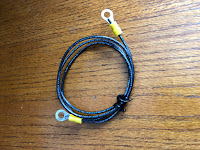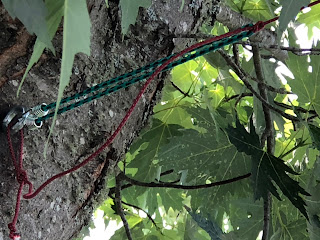 Tweaking the Endfed antenna.
Tweaking the Endfed antenna.
I have been doing some reading regarding Endfed antennas and the length of 44 feet kept coming up as the length for a short Endfed antenna in small lots. My Endfed was just extended from 34 feet to 41 feet which I spoke about in my last post. My plan now was to try the 44-foot length of wire and see what the results were both using a counterpoise and not using one. This was going to be a trial project so the extra 3 feet of wire I am to add is not at this point going to be permanent.
Mike Weir, VE9KK, is a regular contributor to AmateurRadio.com and writes from New Brunswick, Canada. Contact him at [email protected].I cut a 3-foot piece of wire and placed soldered terminal ring connectors at each end. My plan was to remove the antenna wire from the balun end which already had a terminal ring connector on it. Then bolt antenna ring connector to the 3-foot piece and the other end of the 3-foot extension that was to be connected to the balun connector. This would give me the extra 3 feet needed to extend things to 44 feet. Once the 44 feet was stretch out I found out very quickly that 44 feet is the maximum length I can use between my shed and tree.
With the counterpoise attached, I went into the shack and ran through the bands using my MFJ 259B antenna analyzer and recorded the results and then once again with the counterpose removed. As a side note, one of the best purchases I made was the antenna analyzer, it makes short work of most antenna testing tasks. I do have a second antenna analyzer which is the Funk FA-VA4 its a nice unit but because its menu-driven I find it to be a bit cumbersome. With the MFJ unit, you select the band range with one knob and with the other knob spin to your desired frequency and then read the LED readout.
Well back to the Endfed experiment and below are the results with the added 3 feet of wire.
As you can see in the picture the bungee cord allows the tree to sway in the wind but not affect the antenna with the stress of stretching. The red parachute cord you see is there as a backup if the bungee snaps. It was a nice experiment trying the 44 foot but the results were not drastic enough for me to keep with the 44-foot length. The antenna is not back to 41 feet and my curiosity has been solved.
 |
| Three feet of wire |
With the counterpoise attached, I went into the shack and ran through the bands using my MFJ 259B antenna analyzer and recorded the results and then once again with the counterpose removed. As a side note, one of the best purchases I made was the antenna analyzer, it makes short work of most antenna testing tasks. I do have a second antenna analyzer which is the Funk FA-VA4 its a nice unit but because its menu-driven I find it to be a bit cumbersome. With the MFJ unit, you select the band range with one knob and with the other knob spin to your desired frequency and then read the LED readout.
Well back to the Endfed experiment and below are the results with the added 3 feet of wire.
Results without a counterpoise:
Band Freq SWR
- 80. 4.000. 7.5
- 80. 3.500. 6.7
- 40. 7.001. 3.2
40. 7.070. 3.3
30. 10.100. 5.0
30. 10.150. 5.0
20. 14.001. 1.8
20. 14.070. 1.7
17. 18.068. 1.6
17. 18.168. 1.6
21. 21.001. 2.6
21. 21.070. 2.6
Results with a counterpoise:
Band Freq SWR
- 80. 4.000. 9.1
- 80. 3.500. 9.6
- 40. 7.001. 4.4
40. 7.070. 4.4
30. 10.100. 5.0
30. 10.150. 5.0
20. 14.001. 2.4
20. 14.070. 2.3
17. 18.068. 2.0
17. 18.168. 2.0
21. 21.001. 2.6
21. 21.070. 2.7
As you can see from the above results (not sure where the 1,2,3 numbers came from but I just can't seem to remove them without screwing up the chart) the counterpoise only made things worse again. The results without the counterpoise were decent on some bands (80m and 20m) but overall when the Endfed was at 41 feet it was not that different from 44 feet. The one deciding factor for going back to 41 feet was when at 44 the wire was directly connected to the tree. I was not able to add my bungee cord to allow the antenna to have some flex in it when the winds picked up and the tree started to sway. I was not able to add a bungee cord either as this made the antenna wire hang really low.
 |
| bungee allowing for flex when 41 feet long. |














Very good Mike. At least now you aren’t second guessing yourself if you did the right thing or not, you went out and checked it yourself. Now you know you’re at the best length. Good experiment!
73
Ron
Just for clarity, the device in question is an unun (autotransformer) not a balun. A balun is needed further down the coax to stop the common mode current on the outer braid.
– Glenn W9IQ
Good morning Ron very nice to hear from you, yes I am the kind that if I did not try it then it would just roll around in my heard until I did.
73 and have a great weekend,
Mike
VE9KK
Good morning Glenn very nice to hear from you, Glenn you are absolutely correct and it was an oversight on my part.
73 and thanks for stopping by the blog and leaving a comment.
Mike
VE9KK
Thanks for the experiment. I run 41 feet with a 9:1 Unun. Was wondering what longer would do and what counterpoise would do. So, much appreciated article. I’ve read 76feet is good. Plan on trying that (after the hurricane passes). best, j
Good afternoon Jim and thanks for stopping by, it’s true….you never know until you try and I did but it did not turn out to be a benefit. Do let me know how the 76-foot length works out for you?
Have a great weekend and stay safe there in Florida.
73,
Mike
VE9KK
Does the orientation matter in terms of efficiency? In other words will an EF antenna work vertically, horizontally or as a sloper?
Good morning William and thanks for stopping by, that is a very good question! Really with the type of space that I have the configuration is the only one that will fit and be less noticeable to others. Your question will give me something to do during the evening with my cup of tea.
73,
Mike
VE9KK